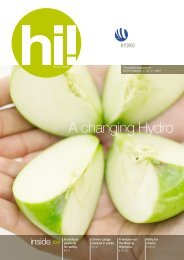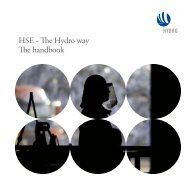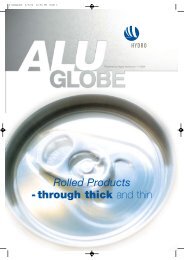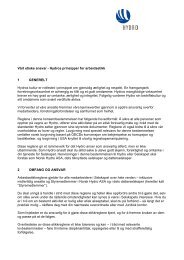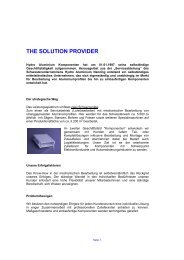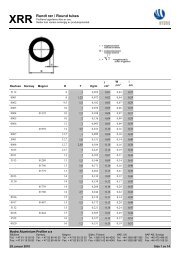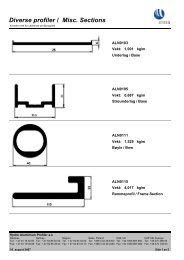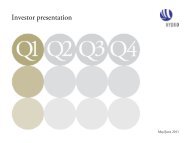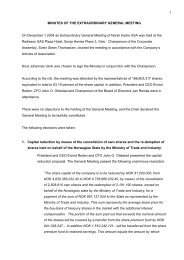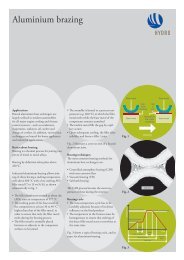Hydro Annual Report 2011b
Hydro Annual Report 2011b
Hydro Annual Report 2011b
You also want an ePaper? Increase the reach of your titles
YUMPU automatically turns print PDFs into web optimized ePapers that Google loves.
108<br />
RISK REVIEW<br />
Risk factors<br />
Risk factors<br />
Below is a description of certain risks that may affect our business, financial condition and the results of operations from time<br />
to time and, hence, our share price. All of the information in this report should be carefully considered, in particular, the risks<br />
described below.<br />
Continued uncertainty and volatility in global economic and market conditions could have an adverse effect on our<br />
operating results and liquidity<br />
Our financial condition and results of operations depend heavily on developments in market demand and global economic<br />
conditions. Market demand and prices declined dramatically in the final quarter of 2008 and first part of 2009 leading to<br />
considerable losses within <strong>Hydro</strong>'s upstream operations and substantially lower earnings for the company as a whole in 2009.<br />
Prices strengthened and demand recovered close to pre-crisis levels in 2010 and <strong>Hydro</strong>'s underlying operating performance<br />
improved significantly in 2011 following the strong recovery in the previous year. However, there has also been a substantial<br />
increase in uncertainty regarding economic developments within the various countries and geographic regions in which we<br />
operate. In Europe, the fiscal crisis has escalated resulting in deteriorating economic conditions in several countries and<br />
southern Europe in particular. It remains to be seen whether initiatives implemented by the EU will be sufficient to adequately<br />
address the underlying fiscal and economic problems. Although considered remote, there is a risk of failure within the currency<br />
union and the political union as a whole. Recovery has been weak in the US and growth has slowed in China and other major<br />
emerging markets.<br />
Based on operating revenues, around 50 percent of <strong>Hydro</strong>'s business is generated within the EU and about 70 percent in<br />
Europe in total. Of this amount, southern Europe represents about 15 percent. Nearly 80 percent of <strong>Hydro</strong>'s business is<br />
generated within Europe and the US combined.<br />
A failure of the Euro or European Union would have far reaching consequences for both Europe and the world economy. In<br />
addition to the indirect effects of a severe general macroeconomic downturn, <strong>Hydro</strong>'s counterparty risk towards key customers<br />
or groups of customers in weak and deteriorating economies could increase significantly. See also risk factor below "<strong>Hydro</strong><br />
faces the risk of counterparty default".<br />
Despite significant curtailments, the global production of primary metal excluding China continues to exceed market demand<br />
and inventories remain at high levels.<br />
Significant cost pressures in the countries in which we operate may inhibit our ability to reduce the operating cost of<br />
our smelter portfolio sufficiently to compensate for an extended period of weak aluminium prices<br />
<strong>Hydro</strong> acted quickly to reduce costs and production capacity following the severe market decline at the end of 2008 and into<br />
2009 but was unable to adjust the costs of its primary smelters sufficiently to avoid substantial underlying operating losses<br />
within its primary aluminium business during 2009. <strong>Hydro</strong> has implemented an improvement program targeting savings<br />
within its wholly owned smelter operations of USD 300 per mt by the end of 2013. However, cost pressure has increased, in<br />
particular raw material costs, which has more than offset targeted savings that were achieved.<br />
The majority of <strong>Hydro</strong>'s smelters are located in countries experiencing strong currencies and/or inflationary pressures such as<br />
Norway, Australia, Brazil, Qatar and Canada. These factors increase our operating costs and weaken our competitive position<br />
in some of the regions where we operate. In January, <strong>Hydro</strong> announced a partial curtailment of its Australian smelter which has<br />
been negatively impacted by the strong Australian dollar.<br />
We may not succeed in making the cost reductions necessary to achieve a sustainable level of profitability for our smelters'<br />
operations in the event of an extended period of weak aluminium prices.<br />
A deterioration of our financial position or a downgrade of our ratings by credit rating agencies could increase our<br />
borrowing cost and cost of capital and have an adverse effect on our business relationships<br />
It is important for <strong>Hydro</strong> to maintain its investment grade credit rating for competitive access to capital and to support its<br />
business relationship with customers, suppliers and other counterparties. Our credit rating is also an important factor in<br />
making <strong>Hydro</strong> attractive as a joint venture partner for new growth initiatives. Following the severe market downturn in the<br />
aluminium industry at the end of 2008 and beginning of 2009, our ratings were downgraded, together with other competitors



